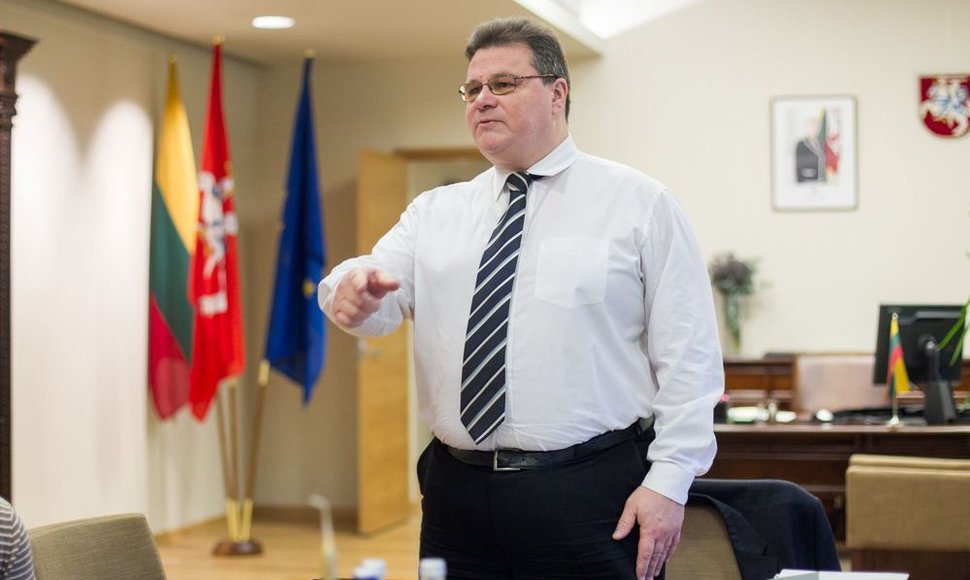In an interview to 15min, Linkevičius says that Lithuania must not be hostage to the past in dealing with Russia; should balance democratic values with pragmatic interests in its treatment of Belarus, and give up the sense of indignation and be more polite while talking to Poland – and keep the old promises once made by Vilnius to Warsaw.
– What are your nearest plans and what's the agenda for the entire term?
– Presidency over the Council of the European Union next year makes all other tasks pale in comparison. All the attention is now focused on this job – not just in our ministry but in all state institutions. What is crucial is a smooth cooperation among them.
When it comes to good neighbourly relations, I still see much room for improvement.
I am a man of consensus, that's what I always seek and I value agreement in areas like defence, foreign policy, security.
Foreign policy requires less revolution and more continuity. In the wake of our independence, we had three main priorities: membership in the EU, joining NATO, and friendly neighbourhood. The first two tasks have been accomplished, but when it comes to good neighbourly relations, I still see much room for improvement. I do not want to be over-dramatic, but nor do I wish to be indulgent.
– What directions will our foreign policy take, geographically speaking?
– There's no either-or in such matters – we need to look in all directions. Neighbours can be different, but they are important to all states. We share EU and NATO membership with Latvia and Poland, we have a common agenda and values, even though there are certain variations. Belarus and Russia have chosen a different path, but that does not mean we have to be slaves to our prejudices and drown ourselves in analysis of differences.
It is an important point – we cannot ignore differences, yet we must underscore the progress and look forward. Only then will we be able to settle our disagreements. The opposite is also an option – we could very well insist on what separates us, reminding of our grievances. I do not believe it a promising option.
In our preparation for the presidency – but not only for that – we need to forge closer working day-to-day relations with the great players of the EU – Germany, France, the UK – transcending the mere handshaking on special occasions. It is also an untapped reserve.
I am convinced that it is difficult to overestimate the role of the US in securing Lithuania's statehood. Maintaining EU-US dialogue – in economic matters, NATO context – is important as well. Let us not forget that NATO guarantees security for Europe.
– This July, you assumed the post of Lithuania's ambassador to Belarus, the country that has had strained relations with the EU. What are your achievements in this area during your four months in Minsk?
– I managed to realize some things and get a sense of what's at hand. Belarusians are fine, simple, sincere people, very similar to us.
Despite big differences – views on political situation, development – they are our neighbours. In relations between states, just like in dealings between people, one must respect one's interlocutor, even if he is unlike you and disagrees with everything you believe in. Only by remaining respectful and speaking in a calm voice can one get across one's message.
– But is it possible to speak with everyone? Let's recall the case of Belarusian opposition figure Ales Belyatsky who was sentenced to a prison term on evidence supplied by Lithuania, or the green activists Mikalay Ulasevich and Tatyana Novikova, who were, for some unknown reason, declared personae non gratae in our country.
– There is indeed not much continuity there. There could be more, provided we make an effort. Sadly, we dedicate little time to foreign policies, all of our attention is swallowed up by seemingly more tangible problems: social issues, healthcare, gas and electricity prices, taxes.
– And what kind of relations do you intend to nurture with Russia? Based on pragmatic considerations or values?
– When I would mention a reset, some people would laugh. I do have a moral right to speak of it, since I've written about it before. In November 2010, the New York Times and Herald Tribune ran my essay “Reset with Russia but with reassurance”. The main message was that when you press the “reset” button on your computer, it does not erase all memory, it is not the same as pressing “delete”. Quite on the contrary – when a new administration comes, it must reset the system.
A reset is a chance to see things you've been overlooking and to make fixes – be they cosmetic or more profound.
– Our relations with the Poles have cooled somewhat over the recent years. President Dalia Grybauskaitė has voiced sharp criticism against Warsaw on many occasions, there's also the debate on the spelling of Polish names, bilingual street signs, problems in education. How do you intend to fix this?
– We must behave like Europeans. When to people meet, one younger and the other his senior, who will extend his greetings first? The one who is more polite. Perhaps this is looking at things too simplistically. But we must keep the promises made by our former leaders. We must do it without breaching the Constitution – and that is possible.
And if we read the Convention for Protection of National Minorities, we can do more than that. But we need to be in agreement and mutual understanding. I am certain that this will not result from doing harm to our language.













